 |
|
| |
| |
|
| |
|
| |

Visit our latest website,
www.dentalthailand.com |
| |
|
| |
| |
|
 |
|
|
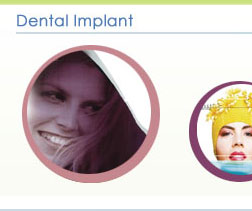 
Dental
Implant in Bangkok, Thailand
|
|
Experience
the world class dental implant Thailand by
team of dental implant specialists at Bangkok
Smile Dental Clinic. We are a team-spirited
and patient-centered office. We believe
in providing the best dental implant solution
for you. We thus continually update our
skills and technology in dental implant
for our patient as well as for our own professional
growth. |
| Bangkok Smile
Dental Clinic takes pride to welcome you to
our well-equipped dental clinic combined with
excellent dental implant in Thailand to
maintain your dental health as well as create
your nice and natural looking smile. |
| Our
dental implant team consists of implantologists, oral
surgeons, and prosthodontists who dedicate
to provide you with the very best quality
in dental implant Thailand within
a warm and caring environment. |
| At
Bangkok Smile Dental Clinic, your beautiful
smile begins with a thorough examination.
Because your dental health is important, we
thus put our effort to ensure that you have
a healthy smile that lasts for a lifetime.
Your new dental implant in Thailand experience
begins here at Bangkok Smile Dental Clinic. |
| A
dental implant is a small titanium screw-like
fixture that serves as the replacement for
the root portion of a missing natural tooth.
The dental implant is placed in the bone of
the upper or lower jaw. After the placement,
the implant has to fuse with the bone (titanium
is one of the best materials to integrate
with natural bone) which can take a couple
of weeks. |
| Treatment time
will vary depending on your situation. It
is possible to get well functioning and esthetic
looking teeth within a few days. In some cases
it may be necessary to wait a longer time
period before finishing the restoration in
order to obtain the best results. |
|
Dental implants can be used to replace a single
lost tooth or a number. Implant supported
replacement teeth look, feel and function
like natural teeth, they preserve the integrity
of a facial structure and improve the look
and function of a jaw. Once the screw-like
fixture is safe, a dentist will screw in an
actual implant that is made to look and replace
natural tooth. |
| Basically anyone
who is missing one or more of their teeth
due to injury, disease, or decay may be a
candidate for dental implants. Sometimes if
there’s a number of teeth missing dental implants
in conjunction with a crown or bridge can
replace them. The rule of thumb is that if
you’re healthy enough to have a tooth extracted,
you’re probably healthy enough to receive
dental implants. |
| Anesthesia
and patient sedation are used to eliminate
any discomfort at the time of the procedure
so there is virtually no pain during the process
of implant insertion. There may be some discomfort
after the procedure but this is usually minimal
and can be significantly reduced – or eliminated
– with a help of painkillers. |
| If you decide
to go ahead with the implants you should know
that advantages of using dental implants for
replacing missing teeth are the following: |
-
First of all, bone loss is stopped when implants
are placed and they can’t be damaged by decay.
- The success rate is quite high. Dental implants
are bio-compatible; they are made out of titanium
that fuses with bone, naturally. Implants
can stabilize dentures as well and it’s almost
impossible to damage them.
- Implants can improve facial appearance as
well as dental function such as biting and
chewing. |
|
| |
| |
What
Dental implants can help?
Naturally, there are many benefits of dental
implants. The benefits of implant
treatment include improved appearance and
self-esteem as well the enhanced ability
to chew and enjoy your food, and often protection
of your remaining teeth and jawbone.
-
Improve your smile
-
Eat the foods you enjoy
-
Restore chewing for easy digestion
-
Speak with greater ease
-
Restore your facial structure
-
Preserve surrounding bone (replace tooth
root)
-
Enjoy an active lifestyle
-
Oral care same as a natural tooth
|
| |
| |
Explanation
of dental implants.
|
Natural
teeth.
Our
teeth are not only essential for life as
chewing tools, but they are also an important
element of our harmonious facial expression,
and thus of our personal charisma. Distinct,
unmistakable facial expressions and untroubled
laughter are determined to a great extent
by the appearance of the teeth. Healthy
and cared-for teeth are a vital requirement
for our aesthetic appearance and clear enunciation.
No matter what we do, the condition of our
teeth is a meaningful visiting card, by
which we and our life circumstances are
judged , whether we like it or not!
Tooth loss
–what can be done?
In
the course of life, teeth can be lost because
of caries, gum disease , or accidents. A
missing tooth can become noticeable functionally
and aesthetically, so that our eating habits
and our outward appearance are impaired.
We would like to have a dental replacement,
which is an inconspicuous as possible, and
which should correspond completely to the
natural model in function and appearance.
Conventional methods –and their disadvantages.
Natural
teeth can be replaced by bridges or dentures.
For bridges, healthy dental enamel as to
be sacrificed by grinding the adjacent teeth.
The gap in the row of teeth is closed by
an intermediate element; however, the lost
dental root is not replaced, which has consequences
for the jawbone, because this will “atrophy”
with time –it lacks the pressure from chewing
transmitted by the root, which normally
stimulates it to constant regeneration.
Dentures lead for the same reason to a disappearance
of the bone mass –an inescapable atrophy
, and the denture has to be constantly corrected.
The result is a denture, which often fits
poorly and this impairs many who wear dentures
greatly in their quality of life; in the
extreme case, this can go so far that they
generally avoid social contact.
|
| |
| |
| Dental
implants –a “natural” solution.
Dental implants are the effective replacement
for lost teeth. As anchors in the jawbone,
dental implants form a stable foundation
for permanent attachment of the crown;
grinding of adjacent teeth does not take
place, and loss of bone tissue by atrophy
is prevented, since implants, as “artificial
dental roots”, transmit the chewing forces
into the jawbone. A single implant as
root substitute is the most elegant way
of achieving a cosmetically ideal closure
of the gap. In completely edentulous jaws,
dental implants are a secure fixation
method for removable full dentures and
so spare the patients the usual disadvantages
of conventional “false teeth”.

How does
a dental implant work?
The
dental implant is a screw-shaped buttress,
which replaces the natural dental root.
The implant is inserted in the jawbone,
where it will be firmly embedded by the
bone after an average of 6-8 weeks. During
this healing phase, dental implants are
usually not covered by soft tissue, so
a further surgical procedure is not required
when the crown is attached.
Dental
implants are made from commercially pure
titanium. This material is integrated
without complications by the body’s tissues,
no allergical rejection reactions occur.
Firm anchorage in the bone and harmonious
adaptation of the gum margin to the implant
body result in a solid foundation for
reliable and long-lasting dental substitution.
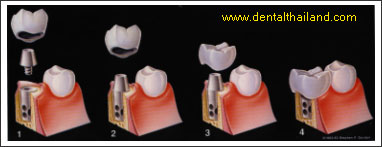
What conditions
must be met for implantation?
Basic
requirements for implantation are an adequate
bone supply with regard to quality and
volume, good oral hygiene, and normal
wound healing capacity. Before implantation,
the natural teeth are rehabilitated, and
any gum disease is treated and eliminated.
Important guarantees of long-term successful
implantation are conscientious oral hygiene
and regular check-ups with the dentist.
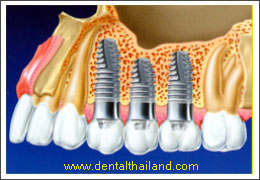
What
costs can be expected?
Since
every implantation represents a completely
individual problem solution tailored to
the special requirements of each single
case, it is not possible to give general
guidelines concerning costs. Our implantologists
will draw up a personal treatment and
cost plan.
A highly
elegant method.
Several
patients world-wide can already report
on the benefits of implant-supported tooth
replacement. Implants are increasingly
recognized as acknowledged beneficial
alternatives to the more conservative
methods of tooth replacement with their
described disadvantages. With conscientious
care –which you are used to for your natural
teeth for a long time –Dental implants
will give you the best functional and
aesthetic service for many years. The
gain in personal quality of life is considerable.
Dental implants have been in use for over
20 years on a scientific basis , and they
have been subject to the strictest quality
controls in research, development, manufacture
, and sales from the start.
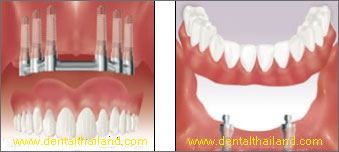
A lifestyle improvement.
Restoring
naturally beautiful, confident smiles
means more than just restoring teeth,
it means restoring and improving your
quality of life. With dental implants,
chewing and speech are restored or improved,
and a permanent natural appearance is
achieved. Whether you are missing one
or all of your teeth, implants allow you
to enjoy your favorite foods and have
the confidence you desire for an active
professional and social life.

|
|
| Dental
Implant Restorations
| Single
Tooth Replacement
- Unlike
bridges and dentures,
implants more closely
mimic natural teeth in
appearance, feel and function.
- Unlike
a conventional three-unit
bridge used to replace
a single tooth, the healthy
adjacent teeth do not
have to be modified to
support the bridge
|
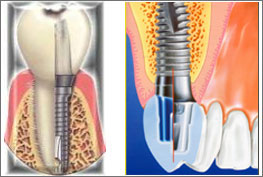 |
|
| |
| |
| |
| |
| Multiple
Tooth Replacement
Titanium implants are
so strong, and bond with
bone so well, that one
may not be needed for
each tooth replaced.
|
|
|
| |
| |
| |
| |
| Regular
dentures VS Implant secured prosthetic
solutions.
|
| |
| |
| |
Regular
Dentures -Benefit
-
Inexpensive
Implant Secured
Prosthetic Solutions - Benefits
-
Increased quality of life
-
Young, Natural appearance for a
lifetime
-
No slipping, sliding or clicking
dentures
-
No worry about your dentures popping
out in embarrassing situations
-
Improved speech
-
Improved confidence and relationships
-
Improved chewing and tasting
-
Eat anything you want
-
Better nutrition and overall health
-
No gum irritation for improved comfort
-
Better functioning teeth
-
Long-lasting value
|
| |
| Choose
the way that reflects your style: |
| |
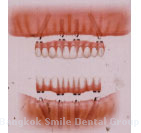 |
ALL-ON-4
(Hybrid implant)
-
Fast, fixed and cost effective
-
Immediate Function in upper
and lower jaw
-
New and predictable protocol
-
Tilted implants for optimal
prosthetic support
-
Fixed bridge
|
| |
|
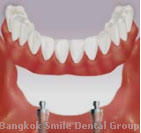 |
OVERDENTURE
(Implant overdenture)
-
Denture stabilized with
implants
-
Possible to use existing
dentures
-
Removable |
|
| |
| |
| Immediate
Function Implant
You can Leave with your new smile. |
| |
| Today
the implant procedure may
be performed with a tooth
crown in place directly after
implant placement or within
a few days, meaning that you
can eat and smile directly
after the treatment. |
| This
makes implant treatment very
similar to general crown &
bridge restorations. The procedure
is easy and very efficient:
in one appointment is not
only surgery performed but
a provisional crown is also
in place. Your discomfort
is much reduced due to the
less invasive procedure. |
| Implants
become a natural adjunct to
teeth and you get immediately
restored teeth – and immediate
quality of life. |
| The
Immediate Function procedure
with Nobel Biocare implants
is clinically proven and the
success rates are similar
to those of conventional implant
protocols. The results from
these studies show that Immediate
Function is possible in all
oral regions and the following
should be considered when
performing the treatment. |
| The
result is that you leave the
chair with teeth in place
after a short and non-traumatic
surgery with a minimum of
post-operative reactions.
This new modality provides
enhanced patient satisfaction
and simplifies the work of
the treatment team. |
|
| |
| |
| FAQs |
| |
| Q |
What
does it mean with Immediate
Function? |
| A |
The
term "Function" was selected
as it reflects the patient's
perspective at implant treatment:
Teeth in "function" immediately
after implant placement.
|
 |
| Q |
What
are the indications? |
| A |
Candidates
for any implant treatment
where high implant stability
can be achieved and the
implant loading can be controlled
in the same manner as for
a conventional two-stage
treatment. |
 |
| Q |
What
factors in treatment planning
are important? |
| A |
There
should be sufficient bone
at the implant site to allow
for a good initial stability.
The occusal conditions should
be possible to control,
i.e. avoiding extreme bruxers,
unstable adjacent teeth,
long cantilevers etc. |
 |
| Q |
How
does the soft bone react
on immediate loading? |
| A |
If
the special implant is used
and if the initial stability
criterion is reached the
implant is likely to have
a good prognosis also in
soft bone. |
 |
| Q |
Does
the surgical steps/site
preparation differ compared
to conventional implant
placement? |
| A |
Firm
initial stability is of
utmost importance. This
can be achieved by using
tapered implants and/or
under-preparation techniques
for the parallel wall implants.
|
 |
| Q |
Isn't
there a high risk with immediate
function in fresh extraction
sites if the extracted tooth
was removed because of infection? |
| A |
If
the socket is curetted and
perfectly cleaned from soft
tissue remnants and an adequate
stability is reached, the
prognosis is likely to be
good. However, more clinical
documentation is called
for at this situation.
|
|
|
|
| Top |
|
|
|